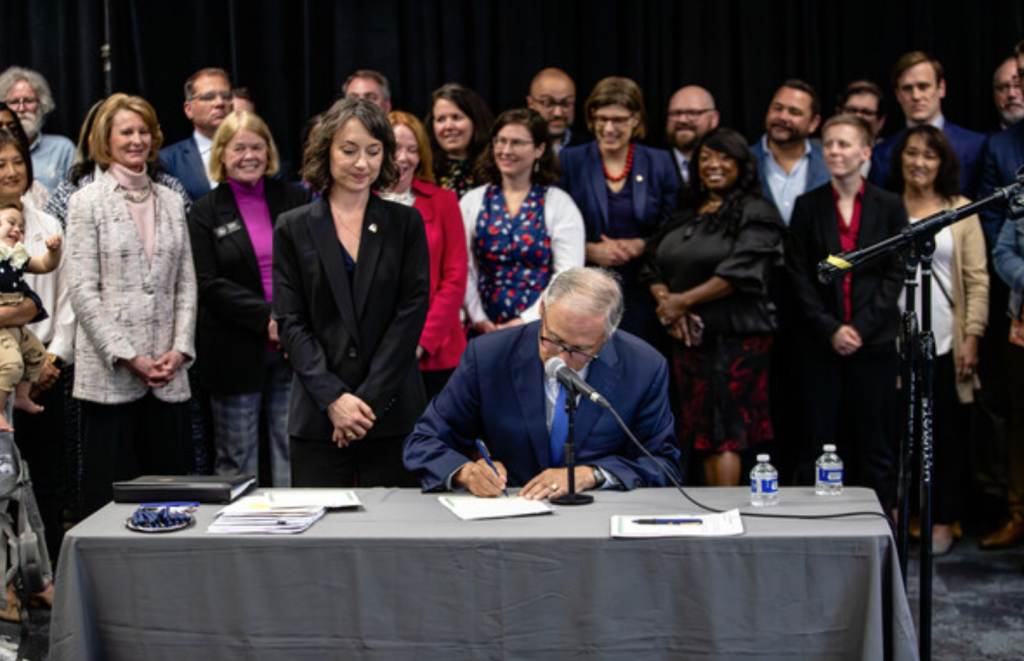
After scoring housing wins in the House, Bateman is seeking to make the jump to the State Senate.
The Washington State Senate is poised for a shakeup in 2025, and one of the most active State House members on the issue of housing affordability is hoping to be a central part of that wave of change. Rep. Jessica Bateman, who has represented Washington’s 22nd District — which includes Olympia, Tumwater, and Lacey — since 2021, is running to replace Sen. Sam Hunt, who announced his retirement earlier this year.
The 22nd District’s senate seat is one of at least seven poised to change hands by the start of next year’s 105-day session. But depending on the outcome of some statewide and Congressional elections this fall, that number could be 10 or more. In a body of just 49 members, many of them long-time veterans, that’s a major shift. The positions set to be left vacant include some major posts, including the majority leader and the head of the Senate’s capital budget team. With significant turnover, especially within the Democratic caucus, progressives are hoping that the Senate will shift leftward and become less of a stopgap for bills coming out of the House.
Just this year, momentum on a transit-oriented development bill, a lot-splitting bill, and a rent stabilization bill all came to a screeching halt after arriving in the Senate, in most cases thanks to a small number of Senators withholding their support. However, many of those Senators, including Mark Mullet (D-5, Issaquah) and Kevin Van De Wege (D-24, Grays Harbor) will not be returning next year.
The Urbanist recently sat down with Bateman to hear her case for joining the legislature’s upper chamber.
Prior to serving in the legislature, Bateman served on the Olympia City Council, where she worked on overhauling the city’s zoning code to allow for denser housing in areas near transit. As someone with deep experience working on housing policy, Bateman is eying a housing committee post.
“I think it’s really important that we have membership on that committee that has local government experience, and that can advocate for abundant housing,” Bateman said. “And I really think that my voice and my experience working on housing legislation on the House side, and all those relationships that I’ve built, will be assets for that committee.”
Senator Patty Kuderer (D-48, Bellevue) is currently chair of the Senate’s housing committee, but she is running for state insurance commissioner, which would open the chair if her bid is successful.
Bateman’s biggest accomplishment in the area of housing is undoubtedly House Bill 1110, legislation that passed in 2023 effectively ending single family zoning in most of Washington’s urban areas. Bateman introduced the bill with Rep. Andy Barkis, a Republican representing the neighboring 2nd legislative district, signaling a desire to move forward with increasing Washington’s housing supply on a bipartisan basis — and circumvent Democratic holdouts, if necessary. While the bill is still in the process of being implemented in cities across the state, HB 1110 was a watershed moment advancing state preemption of restrictive local zoning regulations, which were previously seen as sacrosanct.
Also passing last year was HB 1337, which expanded and standardized rules around how cities allow accessory dwelling units (ADUs). In 2024, those bills were followed by a bill relegalizing single-room occupancy buildings, now called co-living housing, across the state. With these bills, the legislature has been setting a higher floor for residential density and housing action.

Bateman has been laser-focused on ensuring that these bills actually achieve the impact they’re intended to have, and that local governments don’t continue to put up roadblocks to seeing new housing built. This year, she introduced House Bill 2113, known as Washington’s Housing Accountability Act, which would create a system of direct accountability in which the state’s Department of Commerce would verify that cities and counties are complying with all of these housing action and planning requirements. Despite being a brand new idea, HB 2113 was able to pass two House committees during the short 60-day session, but wasn’t able to make it to the floor. Bateman is optimistic that the idea has a clear path forward.
“I do think that the majority of legislators that I spoke to when you explain the problem and the solution, they’re like: yeah, absolutely, we need to do this, because we just did all this work for years, passing legislation to create a floor for all of these housing types in recognition that we’re experiencing a housing crisis, and we have to take action on it,” Bateman said. “So it makes sense that we would actually need to have some system of accountability to ensure that the laws being followed, especially when it’s such a sea change from how we’ve done it before — local control has been the rule of law for so long.”
Under the Housing Accountability Act, the state would be able to determine whether cities are really in compliance with state housing law, and if they aren’t and decide not to correct those problems, require what’s called a “builder’s remedy.” In such a scenario, the state would require non-compliant cities to issue housing permits, even for projects significantly larger than allowed under local zoning, as long as a certain number of the homes are set aside as affordable.
In the wake of lackluster Comprehensive Plan proposals from some cities, Bateman also told The Urbanist that she’s interested in revisiting some of the baseline assumptions around how cities plan for housing growth in Washington. Cities — none more prominently than Seattle — opted to set their sights low for adding housing capacity in their draft growth strategies.
“I’m looking forward to talking to some subject matter experts on the growth targets and how those are formulated and what our options are for requiring cities to aim higher,” Bateman said. “I think, fundamentally, especially in a place like Seattle, which is like the case study — you have a city that is the economic hub of the region. The livability of Seattle, mass transit, all those things: we should be anticipating and planning for extra growth, because we want to have extra housing available for the people that come here and live here. Because then you actually have enough vacancy rate to where you’re going to have competition and you’re going to have more competitive rent prices and home prices. I view that as a public good and a necessity for us to have thriving cities.”

Bateman has criticized the growth plan that Mayor Bruce Harrell released earlier this year, going so far as to suggest that the city’s plan to implement HB 1110 isn’t in compliance with the law, as it seeks to keep swaths of the city indefinitely zoned for just three units rather than four under the guise of preventing displacement.
“I think, especially with Seattle’s Comp Plan coming out, in this latest example of the largest city in the state really doing the bare minimum with their targets, it’s really demonstrating the system currently as it is not working and we need to revisit that,” Bateman said.
Bateman is facing four challengers in this August’s primary election, including three Democrats and one Republican. None of her challengers has held elected office before, or built up a similar resume of policy wins.
While Bateman is one of the most active legislators on the issue of housing, it’s not the only issue that’s important to her. As vice chair of the House’s health care committee, she has sponsored bills to remove barriers that prevent the state from having enough mental health professionals, and wants to continue to push for more behavioral health experts in Washington, particularly in the state’s public schools. She’s also been active on the issue of reproductive health care, and was the House’s prime sponsor of a bill that was signed into law by Governor Inslee protecting the right of Washingtonians to access abortion medications.
But housing absolutely looks to be a priority for Bateman if she’s elected to the Senate. Overall, Bateman sees the passage of bills like HB 1110 as illustrating that public support is strongly behind lawmakers who want to lead the charge for more housing.
“We are in a position now where there’s much more broad support amongst the public for taking direct action to enable housing construction, people understand that we don’t have enough housing for our current population, and that it’s a systemic problem, which requires a systemic solution,” Bateman said. “The sea change has happened, and people view this issue very differently than they’ve done [in the past]. I’ve been working on this for nine years… Nine years ago, the conversation was in a very different place.”
Ryan Packer has been writing for The Urbanist since 2015, and currently reports full-time as Contributing Editor. Their beats are transportation, land use, public space, traffic safety, and obscure community meetings. Packer has also reported for other regional outlets including BikePortland, Seattle Met, and PubliCola. They live in the Capitol Hill neighborhood of Seattle.

